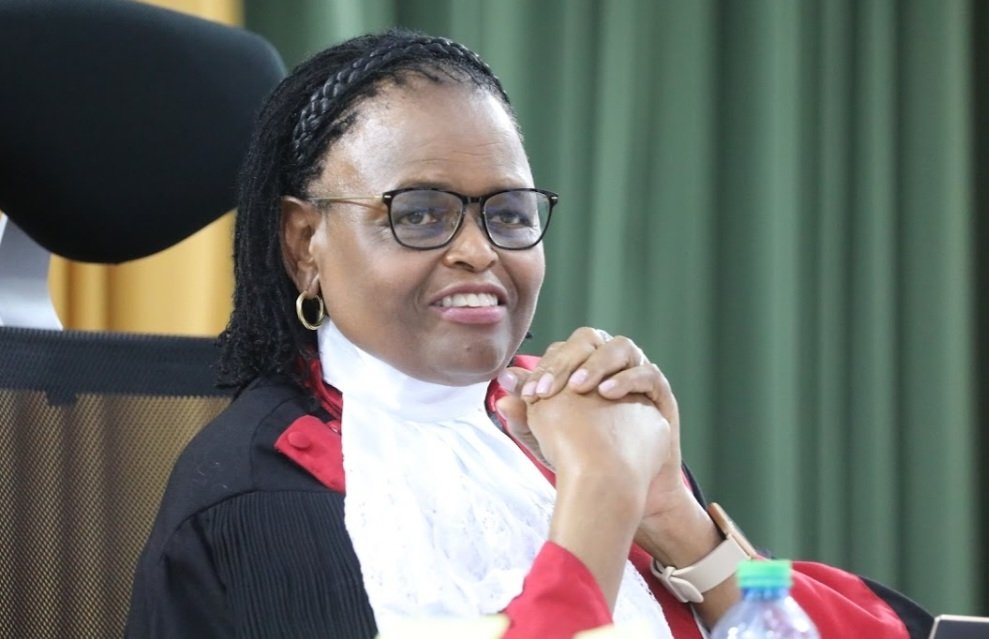
Chief Justice Martha Koome has called on Kenyans to adopt Alternative Dispute Resolution (ADR) methods.
Speaking at the launch of the Kamwangi Law Courts in Kiambu County, Koome said this will help expedite the resolution of disputes and ease the burden on the judicial system.
Koome said the Judiciary is championing ADR techniques, including Mediation and Alternative (Traditional) Justice Systems (AJS) to provide accessible, culturally relevant, and timely solutions to disputes.
The Chief Justice said the inclusion of these alternative methods ensures that conflicts are resolved in ways that align with the unique cultural values and traditions of communities, fostering a justice system that is responsive to the people’s needs.
"I therefore encourage the residents of Gatundu North to embrace mediation as a preferred method of dispute resolution," Koome said.
"Mediation offers a unique opportunity for parties to collaboratively reach a mutually agreeable solution without the adversarial nature of traditional litigation," Koome noted.
She added that in close-knit communities like Gatundu North, where personal and family relationships are closely tied to land and business matters, mediation offers a constructive approach to resolving conflicts and preserving these important ties.
Justice Koome stressed that mediation not only leads to amicable resolutions but also strengthens community cohesion by promoting dialogue and respect among parties.
"By fostering these types of resolutions, we are contributing to a more harmonious society, where peace and unity are upheld," Koome explained.
She further encouraged the residents of Gatundu North to adopt both Mediation and AJS approaches to preserve social harmony.
In her remarks, Koome further reiterated the Judiciary's commitment to broadening access to justice, especially through the integration of Alternative (Traditional) Justice Systems (AJS).
AJS allows communities to resolve disputes using culturally grounded methods, providing quicker and more contextually appropriate outcomes.
"AJS is an essential part of our efforts to expand pathways to justice for all Kenyans," she stated.
The launch of the Kamwangi Law Courts was an important step in fulfilling the Judiciary's ongoing mission to create a more accessible and people-centered justice system.
"Our journey to expand access to justice across Kenya requires partnerships, particularly in light of the budgetary constraints we face. The Kamwangi Law Courts are a great example of what we can achieve through collaboration," she said.
The new court facility will help eliminate geographical barriers, making it easier for residents to access justice without having to travel long distances to neighboring constituencies.
Under the Judiciary’s Social Transformation Through Access to Justice (STAJ) blueprint, the goal is to ensure that judicial services are accessible to all, including vulnerable and marginalised communities.
"Millions of Kenyans aspire to access judicial services that can transform their lives. Today, the launch of Kamwangi Magistrates’ Court brings us one step closer to realizing that vision," Koome said.
Kamwangi Magistrates’ Court, which has jurisdiction over both criminal and civil matters, is part of the Judiciary’s plan to reduce the proximity of courts to under 100 kilometres for every Kenyan.
The long-term goal is to establish a magistrate's court in each of the country’s 290 constituencies. Kamwangi's launch marks the 141 such courts, though 149 constituencies still lack a magistrates' court.
"I take this opportunity to call upon leaders in the other 149 constituencies where we still don’t have courts to join hands with us," the CJ said.
"Together, we can work to ensure that court services are easily accessible for all Kenyans across every constituency."


![[PHOTOS] Ruto at Pope Francis' burial](/_next/image?url=https%3A%2F%2Fcdn.radioafrica.digital%2Fimage%2F2025%2F04%2F844cb891-abd4-4ee5-bc2d-2a0c21fa3983.jpeg&w=3840&q=100)







